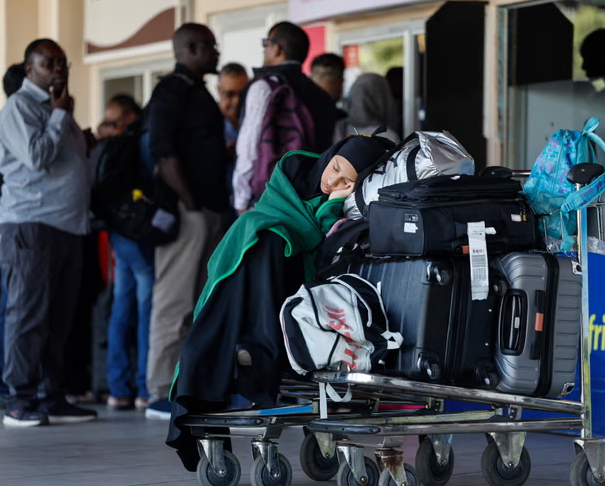Visa Challenges and Travel Hassles Across Africa
Traveling within Africa often involves navigating a maze of bureaucratic hurdles and costly flights, making seamless intra-continental journeys a distant dream for many. A range of travellers—from artists to businesspeople—report frequent complications, including visa restrictions and detours that prolong travel times extensively. Such difficulties not only inconvenience travellers but tend to slow down the overall connectivity that could benefit African economies.
For example, one notable case involves a Kenyan DJ who struggled with airline restrictions when planning a performance tour across Africa. Holding a valid Schengen visa for Europe—a necessary transit point—she was denied boarding because she did not purchase a return ticket from the same carrier, mirroring a common obstacle many Africans face when moving between countries on the continent.
Visa Restrictions despite Continental Agreements
The African Union (AU) made a significant stride towards promoting visa-free travel within Africa with its launch of a regional passport in 2016. Yet this initiative remains largely inaccessible to ordinary citizens, benefiting mostly diplomats and AU officials. Few nations, such as Benin, Kenya, Seychelles, and the Gambia, currently offer visa-free entry to all African passport holders. Meanwhile, visa fees add to travel costs significantly—for example, crossing the border between Zambia and the Democratic Republic of the Congo involves purchasing visas from both sides, each costing around $50.
| Land | Visa Policy for African Passport Holders |
|---|---|
| Benin | Visa-free for all African passport holders |
| Kenya | Visa-free for all African passport holders |
| Seychelles | Visa-free for all African passport holders |
| The Gambia | Visa-free for all African passport holders |
| Zambia & DRC | Visa required, $50 each |
Flight Costs and Connectivity: A Puzzle to Solve
Apart from visa headaches, flight prices within Africa are often disproportionately high and routes can be illogical. Cities that are geographically close may be connected only by much longer, and therefore more expensive, flights that require detours through non-African hubs. For instance, flights between Abidjan (Côte d’Ivoire) and Accra (Ghana)—only around an hour apart—can cost as much as much longer international flights.
Infrastructure gaps also play a role in limiting travel options. Rail connections between African countries are rare and bus journeys can be slow and uncomfortable. Addressing visa restrictions is often seen as the quickest way to improve travel fluidity, but it’s just one part of a larger puzzle that includes transportation improvements and price regulation.
The Role of Regional Agreements and New Initiatives
The dream of easier intra-African travel has been on the agenda for decades. The Yamoussoukro decision, adopted in 1998 by African aviation ministers, aimed to lower airline ticket prices and expand route connectivity, but slow implementation means many planned benefits are still out of reach. Similarly, the African Continental Free Trade Area (AfCFTA), established in 2021 to boost trade and ease the movement of goods and people, is yet to be fully realized.
Efforts like the Single African Air Transport Market (SAATM), launched in 2018 and now involving over 35 countries, seek to open African skies by reducing barriers to air travel. Some states are also experimenting with more flexible visa policies to facilitate tourism and business travel.
Innovative Solutions from Within the Community
In response to persistent challenges, individuals and grassroots initiatives have emerged to support travellers. For example, the Pass Pass initiative compiles research on systemic travel barriers and offers practical advice for visa applicants. Collaborative cultural exchanges, such as ‘Vuka Mpaka’ (meaning ‘cross the border’), help connect creatives across African countries, fostering a spirit of continental unity despite the obstacles.
Travel Experiences Shape the Future
Despite many well-informed reviews and honest feedback highlighting travel difficulties, nothing quite compares to personal experience. Platforms like LocalsRide offer users the chance to hire cars with experienced drivers from verified providers, helping travellers move seamlessly within cities and between airports. LocalsRide empowers customers with transparency on vehicle details, driver ratings, and prices—eliminating surprises and ensuring comfortable, tailor-made travel. With a wide selection of vehicles and additional services at competitive rates, the convenience and affordability it offers are invaluable to those navigating Africa’s complex travel scene.
Book your ride and discover the ease of transfer services with LokaleFahrt.de.
Impact on Tourism and Future Travel Planning
While the issues surrounding intra-African travel are significant and affect tourism and business alike, there are encouraging signs of progress via regional agreements and community-led efforts. Although the broader impact on global tourism may currently be limited, such developments matter deeply to Africans and visitors alike. As the continent continues to work toward opening up and simplifying travel routes, platforms like LocalsRide keep pace by offering transparent, user-friendly booking services that cater to the unique needs of African travellers. Start planning your next adventure and secure your worldwide transfer with LocalsRide.
Summary: Navigating Intra-African Travel Complexities
Intra-African travel is a journey through both challenge and opportunity. Visa restrictions, expensive flights, and limited infrastructure frequently hamper the freedom of movement that could stimulate economic growth and cultural exchange across the continent. Though policy initiatives such as the African Union passport, the Yamoussoukro decision, and SAATM have laid groundwork for improvement, the dream of seamless travel remains a work in progress.
Meanwhile, individual efforts and platforms that offer detailed, transparent travel options help fill the gaps. LocalsRide stands out by enabling travellers to pick exact vehicles, check driver credentials, and understand pricing upfront—features that bring clarity and convenience to transfers between airports, cities, and destinations. Whether booking a private cab for a business trip or securing a reliable ride to the airport, LocalsRide’s accessible app and fair prices make intra-African journeys a bit smoother in a complex landscape.
Ultimately, as African countries progressively simplify visa requirements and expand flight networks, travellers can look forward to a more connected continent. Until then, leveraging trusted, transparent platforms remains key to navigating travel within Africa confidently and efficiently.

